PUTRAJAYA: Specific funding for the ecosystem of entrepreneurship programme under the Sabah Regional Entity Regulatory Authority is important in efforts to empower the Bumiputera economy in the state, said Sabah Institute For Development Studies chief executive officer, Datuk Dr Ramzah Dambul (pix).
Ramzah said the funding aspect was one of the main resolutions presented at the Bumiputera Economic Congress (KEB) 2024, to encourage local economic development, and it was also suggested that there be a transition from a government centric to a civil movement and ‘local champions’.
“The time has come for the federal government to give more governance powers to state governments rather than sticking to centralise or centric approach.
“My suggestion includes some things can be managed locally or what is said to be a ‘local champion’,“ he said in a presentation titled Sabah Bumiputera Socioeconomics in conjunction with KEB here, today.
In addition, he also recommended the adjustment of initiatives to help develop the local economy involving Native Bumiputera and Non-Native Bumiputera.
Five main initiatives need to be implemented in the state relate to connectivity and access including communication networks, bridging the economic gap and the provision of inclusive infrastructure facilities, he said.
This will enable more business and entrepreneurship opportunities with a stronger ecosystem not only among industry players but also local residents.
In the meantime, he suggested that a new direction and approach that is fair, equitable and inclusive be implemented comprehensively in the state in measuring the level of participation and control of the Bumiputera economy at the national level.
“Therefore, in order to strengthen the ecosystem, strengthening the capacity of strategic industries, local industries, supply chains, entrepreneurial coordination systems and the expansion of employment opportunities must be implemented.
“We hope there is something specific for the state of Sabah in this KEB finding,“ he said, adding that the main contributors to Sabah’s Gross Domestic Product (GDP) are services 49.5 per cent, mining and quarrying (24.8 per cent) and agriculture (15.2 per cent). -Bernama









